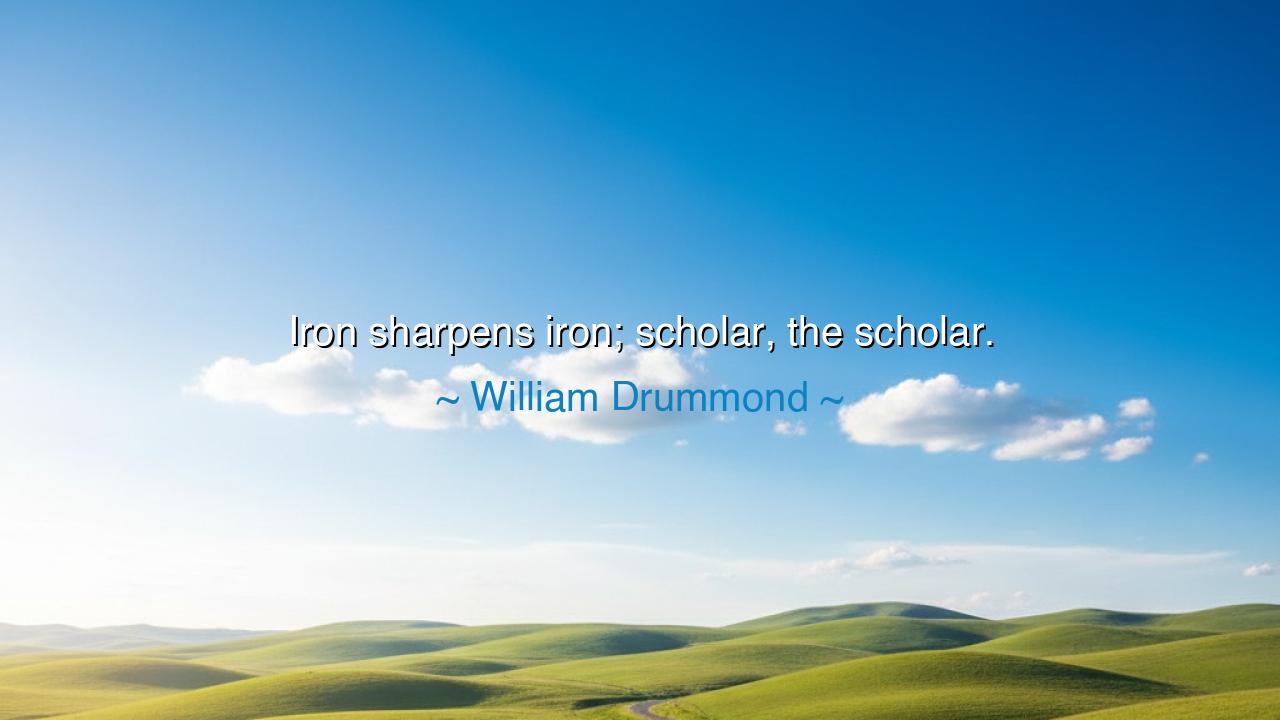
Iron sharpens iron; scholar, the scholar.






“Iron sharpens iron; scholar, the scholar.” Thus wrote William Drummond of Hawthornden, a poet of the seventeenth century, whose pen sought not only to capture beauty but to refine the mind. In these few words lies a truth as enduring as the forge and the blade: that wisdom is tempered by the presence of another, and that the mind of man grows keener only through challenge, dialogue, and communion with equals. Just as iron cannot sharpen itself but must meet the edge of another to gain its keenest form, so too must the scholar encounter another scholar — through conversation, debate, and shared pursuit of truth — to awaken the full brilliance of his intellect.
Drummond lived in an age of great learning, when men of letters and faith sought to balance reason with revelation. In those days, solitude was honored, but it was understood that even the most brilliant mind required the friction of others to polish its thought. His saying draws its root from the ancient proverb, “As iron sharpens iron, so one man sharpens another,” found in the sacred texts of old. Yet Drummond refines this teaching with his own emphasis: that the scholar is the scholar’s whetstone — each mind a tool in the shaping of another, each word a spark that kindles greater thought. For learning, when isolated, grows dull; but when shared, it becomes flame.
There is a story told of Socrates, the philosopher of Athens, who spent his days not writing treatises, but questioning men in the marketplace. He drew forth wisdom not through lectures, but through dialogue — by sharpening his mind and theirs alike upon the whetstone of reason. His student Plato, in turn, recorded these conversations, preserving for all time the living spark that passes between two seeking souls. This, too, is what Drummond meant: that the true education of the mind is born in encounter, not in isolation. A scholar without conversation is like a sword left in its sheath — it gleams perhaps, but it never cuts.
When two minds meet in honest discourse, something sacred occurs. The friction of thought against thought produces clarity, as the strike of metal produces light. Disagreement, far from being an enemy to wisdom, is its crucible. The weak mind fears contradiction; the strong welcomes it, knowing that every challenge hones the edge of understanding. Thus, the scholar must seek not flattery, but intellectual battle — not to conquer, but to perfect himself. For it is not ease, but testing, that strengthens the spirit and the mind alike.
Consider, too, the age of the Renaissance, when thinkers like Leonardo da Vinci, Michelangelo, and Galileo transformed the world through study and rivalry. These men did not toil in ignorance of one another; they competed, argued, and learned from the brilliance of their peers. Each man’s genius spurred the other toward greater heights. Their friendship was not always gentle, but it was fruitful, for through their shared striving, the world was reborn in light and discovery. Iron sharpened iron, and civilization itself grew sharper.
Yet, the wisdom of Drummond does not speak only to scholars of books. It speaks to all who would grow in any art, craft, or virtue. The blacksmith learns from another’s hammer; the musician refines his soul through duet and harmony; the leader becomes wise through counsel. To walk alone may seem noble, but it leads to stagnation. The wise seek companions who challenge them — who do not echo their thoughts but refine them. Thus, the counsel of Drummond is not for the academic alone, but for every soul who would master his own craft or conscience.
Therefore, remember this: seek those who sharpen you. Do not fear the friction of debate, nor the sting of correction. Surround yourself with minds that test your own, for ease breeds dullness and comfort dulls brilliance. Speak with those who make you think, and listen to those who make you question. For the edge of wisdom is not forged in silence, but in the ring of voices striving toward truth.
So let Drummond’s words be a fire in your heart: “Iron sharpens iron; scholar, the scholar.” Be not content to think alone, nor to dwell among flatterers and echoes. Find those who provoke you, who demand your best, who strike your thought until it gleams. In such company, you will not remain as you are — you will become refined, sharpened, alive. For the mind, like a blade, must meet its equal to know its strength. And when it does, both are transformed — not dulled by conflict, but forged in wisdom, ready to carve truth from the chaos of the world.






AAdministratorAdministrator
Welcome, honored guests. Please leave a comment, we will respond soon